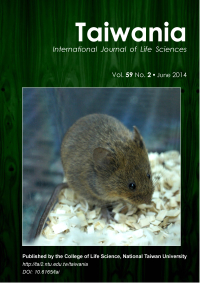Research Paper
Partner Preference and Mating System of the Taiwan Field Vole (Microtus kikuchii)
Chia-Chien Lee, Chih-Hsien Chiu, Liang-Kung Lin and Y. Kirk Lin
Published on: 16 June 2014
Page: 127 - 138
DOI: 10.6165/tai.2014.59.127
Abstract
The mating system of the Taiwan field vole (Microtus kikuchii) has been proposed to be monogamous. In monogamous animals, individuals should exhibit monogamy syndromes, such as little sexual dimorphism and strong pair bonding (a strong social preference for a familiar partner versus a strange one). In this study, we examined the effect of cohabitation on the partner preference. In a reciprocal experiment, all test individuals were cohabited with a heterosexual vole for 24 hr prior to the partner preference trials. We collected the feces of voles before and after the trials, and analyzed the concentration of fecal steroid hormones, including testosterone of males, progesterone and estradiol of females, and corticosterone of all voles. The results showed that the behaviors of focal voles were not influenced by the status (partner or stranger) of stimulus vole. There was no significant relationship between steroid hormones and partner preference. Furthermore, the degree of sexual dimorphism in the Taiwan field vole was low, and similar to that of the monogamous prairie vole (M. ochrogaster). In light of this study and other recent findings, we propose that the mating system of the Taiwan field vole is not strictly monogamy, but flexible depending on environmental conditions.
中文摘要
台灣高山田鼠 (Microtus kikuchii) 的婚配制度極可能是哺乳類中罕見的一夫一妻制。一夫一妻制動物會表現伴侶偏好行為,即行為上偏好同居或配對過的異性個體顯著多於陌生個體,但伴侶偏好可能會受到固醇類賀爾蒙(性賀爾蒙及壓力賀爾蒙) 濃度左右。我們以伴侶偏好行為實驗 (partner preference test) 測試台灣高山田鼠是否表現 [同居過的雌雄個體接觸時間應顯著多於與陌生個體的接觸時間],過程以錄影記錄並進行分析。另一方面,在行為實驗的前及後4–5天收集高山田鼠每日的糞便,以酵素免疫分析法 (enzyme-immunoassay method) 獲得實驗雄性田鼠的睾固酮 (testosterone)、雌性田鼠的孕酮 (progesterone) 和雌二醇 (estradiol) 及每隻田鼠的壓力賀爾蒙 (corticosterone)。伴侶偏好行為實驗結果顯示雌性與雄性高山田鼠均沒有任何伴侶偏好。在實驗前後的固醇類賀爾蒙濃度亦未顯示對高山田鼠個體的伴侶偏好有任何顯著性的影響。另一方面,高山田鼠具有較小的體重雌雄二型性,與一夫一妻制的草原田鼠 (M. ochrogaster) 相似。由於台灣高山田鼠並未表現出伴侶偏好行為,其婚配制度可能不是嚴謹的一夫一妻制。未來其婚配制度的研究需檢視更多與一夫一妻制相關的生理現象,並探討婚配制度可能依環境而易的情況。
Keyword: EIA, mating system, partner preference test, steroid hormone, sexual dimorphism, Taiwan field vole.


